Experts weigh in on the health effects of marijuana

William Checkley, MD, PhD ’02, ScM ’96, an associate professor in International Health was part of an expert committee convened by the National Academies of Sciences, Engineering, and Medicine to evaluate recent research on the health effects of recreational and therapeutic cannabis use. The committee’s report, —The Health Effects of Cannabis and Cannabinoids: The Current State of Evidence and Recommendations for Research—presents nearly 100 conclusions related to the health effects of cannabis and cannabinoid use.
“This was one of the most comprehensive reviews conducted on the health effects of cannabis,” says Checkley. Not only did the committee look at cannabis use for therapeutic purposes as part of medical treatment, it also analyzed research on the health effects caused by recreational use of the drug.
“Our findings have important implications for an array of public health issues, including injury prevention, newborn care and mental health.” Checkley says. "For instance, there was compelling evidence that use prior to driving was associated with a higher risk of being involved in a motor vehicle accident.”
Not all the research the committee reviewed had the same level of evidence. The committee, therefore, broke their findings into different levels, ranging from no evidence to substantial or conclusive evidence of a health effect. Findings with very strong supporting evidence include the following:
Therapeutic Effects
-
Patients with chronic pain who were treated with cannabis or cannabinoids were more likely to experience a significant reduction in pain symptoms.
-
For adults with multiple sclerosis-related muscle spasms, there was substantial evidence that short-term use of certain oral cannabinoids improved their reported symptoms.
-
In adults with chemotherapy-induced nausea and vomiting, there was conclusive evidence that certain oral cannabinoids were effective in preventing and treating those ailments.
Risks
-
Long-term cannabis smoking was associated with worse respiratory symptoms and more chronic bronchitis episodes.
-
Cannabis use prior to driving increases the risk of being involved in a motor vehicle accident.
-
Smoking cannabis during pregnancy was associated with lower birth weight in the child.
The report is now available online along with a short summary of health effects findings. The committee notes that there were several challenges to conducting the review, including regulatory barriers such as classifying cannabis as a Schedule I substance. The report found that these barriers are impeding the advancement of research of the effects of cannabis use.
